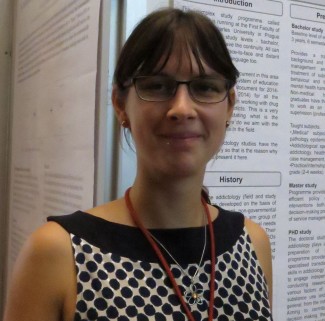Overview of European University-Based Study Programmes in the Addictions Field

In 2015, the team from the Department of Addictology (First Faculty of Medicine of Charles University and General University Hospital in Prague) in cooperation with our colleague from the Department of Community Medicine & Health Care, University of Connecticut School of Medicine, Professor Thomas Babor, conducted an internet survey focused on mapping how many university-based programmes in the addictions field are available in European countries and what their characteristics are. It is a unique comprehensive attempt to prepare an overview of such programmes in Europe, being realized under the auspices of and in cooperation with the ICUDDR (www.icuddr.com) and its Coordinating center for Europe (Charles University).
We built on our own experience with the programme called Addictology operating at Charles University in the Czech Republic.
The frame and together the main limit of this work were only a few pre-defined key words for databases searching (addiction studies and drug/alcohol studies, master in addiction, addiction counselling and substance use). The identified programmes were subjected to a content analysis.
All findings had been published in the Drugs: Education, Prevention & Policy Journal in 2017 (see the full citation below). Here we present the main findings from this European survey.
We found 25 universities in 8 European countries that together offered 34 addiction studies programmes, awarded with a degree. In total, 6 programmes were at the bachelor‘s level (15,4 %), 18 programmes were at the master‘s level (43,6 %), and only 4 programmes were offered at the doctoral level (Ph.D., 12,8 %).
Number of addiction studies programmes
United Kingdom: 25
Czech Republic: 3
Spain: 2
Germany: 1
Denmark: 1 (joint degree with Italy and UK)
Finland: 1
Netherlands: 1
The largest number of programmes was identified in the United Kingdom, this could be explained by a number of various degree possibilities in this country (such as foundation degrees or postgraduate certificates/diplomas) and a long history in developing addiction studies education. Only the Charles University in the Czech Republic offered three programmes, or more precisely one programme called Addictology at all academic levels (bachelor‘s, master‘s and doctoral), and so the most comprehensive education in the field.
Most programmes (N=25) were focused specifically on the addictions field which is being reflected in their titles, and nine programmes were parts of other disciplines such as psychology, law or public health.
We tried to assume the background of the programmes based on the faculty or department that operated them, and found the same number (N=5) representing programmes built on medical and social base, four programmes were psychological, two were specifically oriented on research. The most common title of such a programme was „addiction studies“ yet this result could be influenced by the key words we used for searching.
One third of programmes was offered both full-time and part-time, eight programmes enabled only a full-time format of studies and five only part-time. Seven programmes (20%) were offered only online or in a distance learning format. Most bachelor‘s programmes last three years and most master‘s two years full-time. Doctoral studies are more individual in all characteristics.
The basic admission condition is the relevant previous education (secondary school for bachelor‘s, bachelor‘s degree for master‘s programmes) yet there are other conditions, sometimes the applicants have an opportunity to study if they have adequate professional experience.
Seventeen programmes stated on their websites that they included some form of practical experience (internship, clinical practice, practical teaching, voluntary work). Six programmes mentioned that the clinical practice or research placement is a compulsory part of the study so as to be assessed at the end of studies. Other forms of assessments include written and oral exams.
The most frequent courses and study modules were identified as following: research methodology (25), basic theories and models of addiction (18), intervention methods and skills (17), treatment and recovery (10), criminal justice and law (10), mental health, dual diagnoses (10), social work (9). Within the less represented courses were harm reduction, psychology, management, prevention, family therapy or neuroscience.
Our data show that the study programmes in the addictions field are diverse and complex, they were created within various contexts and independently of each other. There are some attempts to cooperate and we would like to facilitate this process.
It is necessary to emphasize that there is still an important need and key role of other professions that had worked in the addictions field even before the addiction specialization was created. The narrow specialization, and maybe the unique position as a healthcare professional (the case study of the Czech Republic), the addictologist could serve as a base for contact with people with substance use disorders and other addictions, and is definitely not able to work effectively for a client‘s needs without cooperation with other colleagues.
Charles University became the Coordinating Center of ICUDDR for the Universal Prevention and Universal Treatment curricula for Europe, so we are ready to share our experience in implementing UPC/UTC. We also continue our work of mapping the academic addiction programmes in the rest of the world. This work will will be published soon, both in professional journals and also in short summary versions on the websites of ICUDDR (www.icuddr.com) and ISSUP (www.issup.net). You can follow us on ResearchGate or contact the corresponding author, Amalie Pavlovská (amalie [dot] pavlovska [at] lf1 [dot] cuni [dot] cz (amalie[dot]pavlovska[at]lf1[dot]cuni[dot]cz)). It is our great honour to be in touch with colleagues from the field and create a strong network of people interested in the education in the addictions field around the world.
Citation of the original paper: Pavlovská, A., Miovský, M., Babor, T. F. & Gabrhelík, R. (2017). Overview of the European university-based study programmes in the addictions field, Drugs: Education, Prevention and Policy, 24:6, 485-491. DOI: 10.1080/09687637.2016.1223603
